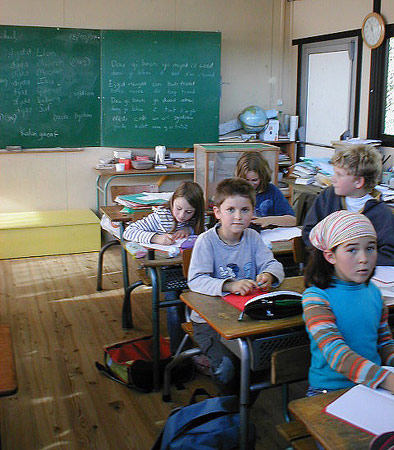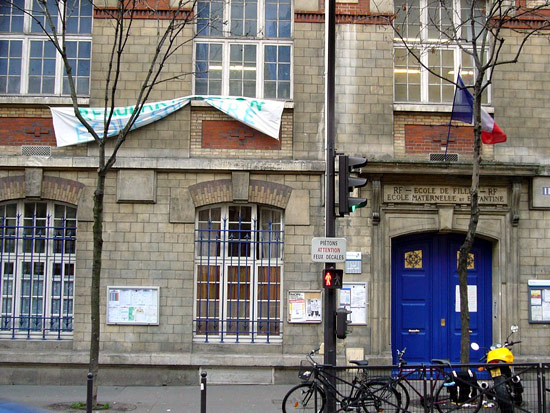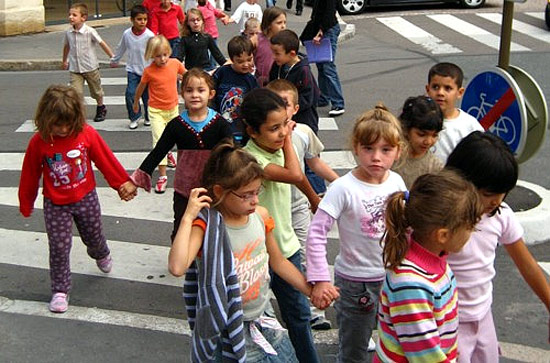Education: Education Structure
Introduction
School education is compulsory in France between the ages of 3 and 16. Homeschooling is legal under certain regulated conditions, with prior authorization from the government required as well as mandatory annual registration and inspections. French schools typically do not require the wearing of uniforms. Girls and boys are educated together, and the curriculum is secular. The language of instruction is French.
Formal structure of the school system
School is compulsory for 13 years of pre-school, primary, and lower secondary education. Students may then progress to upper secondary, where they can choose a three-year general course of study or follow a technical or professional path which allows for a two- or three-year program.
Pre-school
Type of school:
Length of program: 3 years
Age: 3 to 5 years
Primary
Type of school:
Length of program: 5 years
Age: 6 to 11 years
Lower Secondary
Type of school: Collège
Length of program: 4 years
Age: 11 to 15 years
Final award: Brevet des Collèges
Upper Secondary
General
Type of school: Lycée général
Length of program: 3 years
Age: 15 to 18 years
Final award: Baccalauréat général
Technical
Type of school: Lycée technologique
Length of program: 2 to 3 years
Age: 15 to 17 or 18 years
Final award: 2 years: Certificat d'Aptitude professionnelle (CAP) or Brevet d'Etudes professionnelles (BEP); 3 years: Baccalauréat technologique
Vocational
Type of school: Lycée professionnel
Length of program: 2 to 3 years
Age: 15 to 17 or 18 years
Final award: 2 years: Certificat d'Aptitude professionnelle (CAP) or Brevet d'Etudes professionnelles (BEP); 3 years: Baccalauréat professionnel
School Timetable
The academic year in France runs from September to June or early July, with a long vacation from July to September 15 and four school holidays spread throughout the year. The Ministry of Education sets the school calendar; winter and spring holidays vary by region.
The school week is about 24 to 28 hours long, with some schools opting for a five-day week (Monday through Friday), while others adopt a four-day week (Monday through Friday, but excluding Wednesday). The school day usually has two breaks, with lunch hours lasting between one to two hours.
Semester dates: Mid-September to late June or early July
School days: Monday to Friday (Wednesday may be a half day or off entirely)
School hours: 08:30 to 16:30
Grading System
Secondary schools and higher education institutions in France grade student performance on a numerical scale from 0 to 20. On this scale, 20 represents the highest grade, 16 and above is considered très-bien (very good), 10 is the minimum passing grade, and scores of 9 and below constitute failing grades.
Cost of Schooling
While there is no charge for state schooling and textbooks in France, parents must supply stationery and additional funds for school outings. Parents are also often obliged to pay for insurance to cover risks at school and during outings.
Special Schools
French schools usually do not have special education departments but will often attempt to make allowances for certain needs. The country’s Services d'éducation spéciale et de soins à domicile (SESSAD) ensure that children and teenagers who have mental, motor, and sensory disabilities are able to access ongoing education.
Classes d'intégration scolaire, or special integrated classes, are available for children who have disabilities too severe for full inclusion but that would not necessarily require special facilities. These classes take place within ordinary schools and maintain the mainstream curriculum. Students eligible for these classes have cognitive learning disorders, severe mental development limitations, hearing impairments, visual impairments, or physical disabilities/severe motor deficiencies. Separate classes are created for each of these categories.
Learning assistance is provided outside of school hours by therapists, and children may be admitted to specialist schools if they require constant or specific assistance.
Curriculum
The French Ministry of National Education and Youth sets the national curriculum. French, foreign languages, and mathematics occupy the most time in the curriculum, followed by history, geography, physics, chemistry, and other sciences. Students should attain a good command of written and spoken French, French literature, the principles of mathematics, one foreign language, the basics of science and technology, arts, sports, and the basics of the history and geography of France, Europe, and the rest of the world.
Ministère de l’Éducation nationale et de la Jeunesse
(Ministry of National Education and Youth)
110 Rue de Grenelle
75357 Paris SP 07
Tel: [33] 1 55 55 10 10
Web: www.education.gouv.fr
Copyright © 1993—2024 World Trade Press. All rights reserved.

 France
France 

